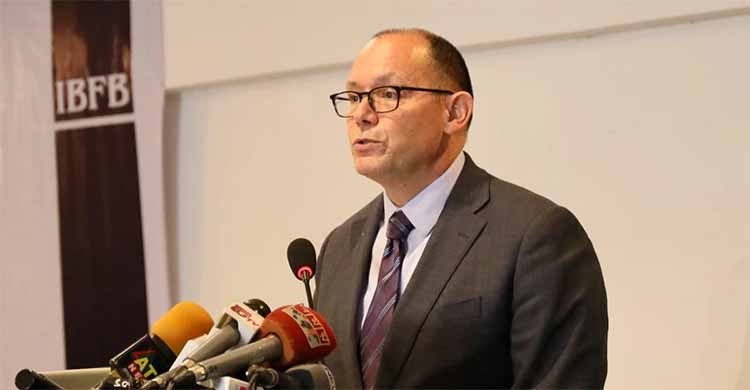Special economic zone not enough to attract best investors: Peter Haas
27 September 2022, 07:41 pm | Updated: 25 February 2025, 09:06 am

US Ambassador to Bangladesh Peter Haas has said a smart company considering doing business overseas will certainly want “certainty and security” as political violence and electoral instability “scare” them.
He said a smart company considering doing business overseas also wants to see certain things, including a developed transportation system, consistent access to power and water, and a well-trained workforce and Bangladesh has made great strides in filling these needs, reports UNB.
The US envoy said the international companies and investors must become more aware of the opportunities Bangladesh presents.
“Bangladesh must be ready to welcome American businesses,” ambassador Haas said while speaking at a programme hosted by International Business Forum of Bangladesh (IBFB) at a city hotel on Tuesday as the chief guest.
Founding President of IBFB Mahmudul Islam Chowdhury, Chairman of Policy Research Institute of Bnagladesh Dr Zaidi Sattar, Ambassador and Head of Delegation of the European Union Charles Whiteley, IBFB President Humayun Rashid and its Vice President MS Siddiqui also spoke.
Hailing Bangladesh’s economic progress over the years, ambassador Whiteley said the country needs to work ensuring equal level playing field for both local and overseas investors.
He said the EU wants to work with the Bangladesh for her smooth transition from the LDC. “EU wants to boost commercial ties further as the largest trading partner of Bangladesh.”
Ambassador Haas said there are strong reasons to look at Bangladesh for market opportunities and Bangladesh is worthy of their attention.
“Even in these challenging times, Bangladesh has a great macroeconomic story to tell. It has been among the fastest growing economies in the world over the past decade,” he added.
Its GDP grew even during COVID-19 lockdowns, and, according to the Asian Development Bank, the economy is estimated to grow by 6.6 per cent over the next year.
The country’s financial leaders have so far managed its debt well and are taking important steps to deal with the inflationary pressures resulting from Russia’s unprovoked invasion of Ukraine.
“Yes, times are tough. And as the World Bank recently pointed out, Bangladesh needs additional reforms in order to maintain its economic expansion going forward. But so far, the macroeconomic situation seems manageable,” said the US envoy.
Special economic zone not enough to attract best investors: US Envoy
Haas said they at the Embassy are focused on key objectives - a peaceful and stable Bangladesh, a Bangladesh that is committed to democracy, transparency, pluralism, tolerance, good governance, and respect for human rights; a socially and environmentally resilient Bangladesh and supporting Bangladesh’s efforts to host the Rohingya refugees and until a safe, voluntary, and dignified return to Burma is possible.
“Each of these first four goals underpins our fifth goal: supporting Bangladesh in its efforts to achieve sustainable and broadly shared prosperity, improve labor standards, expand and diversify Bangladesh’s economy, and open it to greater regional and global trade and connectivity,” he said.
Haas said many U.S. and international businesses want to expand in the region and they want to help Bangladesh create a business climate that is as welcoming as possible to foreign investment. “Clearly Bangladesh has a lot to offer international businesses.”
The ambassador said the Bangladesh Investment Development Authority has recently signed a Memorandum of Understanding with U.S.-based Anchorless Bangladesh to tell Bangladesh’s story to international investors.
“But the other question is: Is Bangladesh ready to welcome investors, facilitate their entry into the market, and make life as easy as possible for those who have already invested?”
As Bangladesh graduates to middle-income status, ambassador Haas said, it will find it has many competitors also hungry for international business. “It’s one thing to build a special economic zone, but that alone is not enough to attract the best investors.”
Prime Minister Sheikh Hasina addressed the U.S.-Bangladesh Business Council in New York last week.
In her speech, she noted that Bangladesh is continually working to improve its physical, legal, and financial structures in order to improve the investment climate here.
“The entire business community – both in Bangladesh and internationally – welcomes this commitment,” said ambassador Haas, adding that the United States stands ready to assist these efforts in whatever way they can.
At the 16th Annual General Meeting (AGM) of the IBFB, participants laid emphasis on further improvement of business climate to create more jobs through attracting global investors.
They also called upon the policymakers to bring necessary changes and implement those with replicating successful RMG (readymade garment) model to other export-oriented sectors making them more competitive enough.
Terming export diversification key for sustainable growth of the economy, Chairman of Policy Research Institute (PRI) Dr Zaidi Sattar said Bangladesh needs to replicate the successful RMG model to other non-RMG sectors. He also suggested rationalization of the tariff structure.
IBFB President Humayun Rashid said the private sector is considered as the engine of economic development in a developing economy.
Vice President (Finance) Lutfunnisa Saudia Khan and President, IBFB Chittagong Chapter SM Abu Tayyab were present.






















